Five rules for brewing coffee and how to establish your own coffee style-"Coffee Taste"
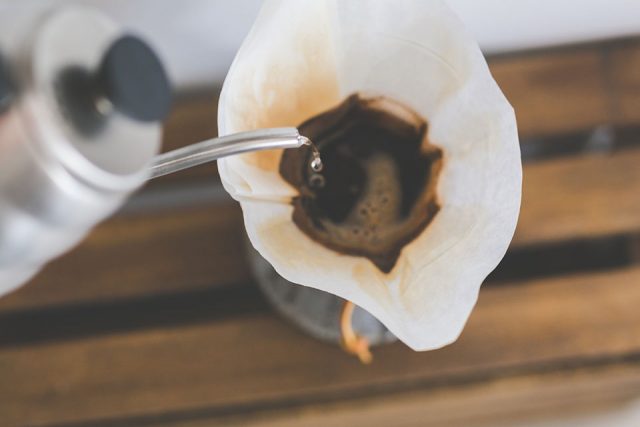
For professional baristas, please follow the coffee workshop (Wechat official account cafe_style)
Many methods or data of brewing coffee can be appropriately adjusted according to each person's preference, experience and taste, but there are still some general principles of brewing coffee in common. Here are five points, which are called "five rules for making coffee".
1. Fresh coffee beans
two。 Correct grinding
3. Good water quality
4. Appropriate water temperature
5. Make it gently
No matter what kind of brewing method or personal habit, these five rules can be said to be applicable all over the world. if you violate any of them in the brewing process, the result is likely to be a failed cup of coffee! Next, let's take an in-depth look at the contents of these five rules.
Fresh coffee beans
If you ask a famous chef: how to cook delicious food? I believe that there must be an item of "fresh ingredients" in his answer, because as long as he is a good cook, he will not use stale, out-of-date materials to cook his specialty dishes. So is coffee. The first step in a good cup of coffee is fresh coffee beans.
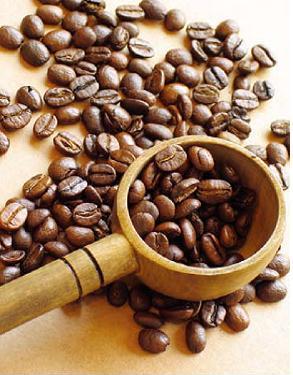
What are fresh coffee beans? Please refer to the shelf life of coffee beans listed in the table below, you may be surprised by the harsh conditions, but in fact, coffee beans begin to lose their freshness after baking, and as the time spent in contact with the air increases, the beautiful substances in coffee beans gradually decrease, especially those that have been ground. Why do ground coffee beans have a shelf life of only 5-10 minutes? The main reason is that the surface area of ground coffee beans has become very large, so the rate of oxidation is relatively increased several times, and it will not be long before coffee beans go bad because of oxidation, let alone want to make good coffee.
Shelf life of coffee beans (limit)
Raw beans of unroasted coffee for 1-2 years
Roasted coffee beans (for cooking Espresso) take about 3 weeks.
Roasted coffee beans (other than Espresso) for 30-45 days
Ground coffee beans for 5-10 minutes
Coffee beans must be preserved in a good environment to have the above-mentioned lifespan.
Therefore, it is strongly recommended that any coffee must be ground before brewing, and only one cup at a time! Even if there are ten cups to be boiled, wait until you finish one cup and then grind the next cup. Don't grind the heap in advance to save time in making coffee. So the next time you walk into a strange coffee shop, you can feel at least half relieved if you brew it fresh, but if you see the coffee powder that has been ground out of a sealed can when you make coffee, you have to think carefully about whether you want to drink this coffee.
From the point of view of freshly ground and boiled coffee beans, buying ground coffee beans is obviously the most difficult way to keep them fresh. the most common situation is to go to a coffee shop and buy a pound of coffee beans and ask the store to grind them instead. Think about it. How long will it take to finish a pound of coffee beans? A week? Or more than two weeks? No matter how long it takes to finish it, the journey home alone has exceeded the 10-minute period of freshness. How can you expect to brew good coffee with coffee beans that have lost all their freshness?
By the same token, there is no need to blindly believe in foreign brand-name coffee beans, especially those that have been ground, even though manufacturers have repeatedly stressed in their advertisements: we pay great attention to the freshness of coffee beans, airlift to Taiwan every week, and nitrogen filling at low temperature. Wait, but what's right in front of us is out-of-date coffee beans. Therefore, I would like to suggest that you do not need to buy roasted coffee beans (powder) to send back to your friends when you travel abroad next time. I believe there is no need to repeat the reasons.
Second, correct grinding
Because of insisting on freshness, coffee beans must be ground before brewing, so the bean grinder has become a necessary tool, and then put forward a very important idea: a good bean grinder is more important than a good coffee maker! In the pursuit of good coffee, a high-level bean grinder is absolutely necessary.
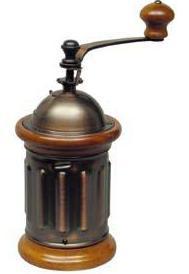
Why is the bean grinder so important? The true meaning of the so-called brewed coffee is "correct extraction of substances from coffee beans". The key to achieving this goal is to "accurately control the thickness of coffee grinding and the time of brewing". There is a close relationship between the two. Why control the cooking time? Because "the oil and aromatic substances of coffee beans will be dissolved by water first, caffeine and bitter substances are slower." so when brewing coffee, from the moment the water comes into contact with the coffee powder, stop the extraction at an appropriate time. Separate the brewed coffee from the coffee powder as soon as possible to avoid those substances that we don't want to enter the coffee from the coffee powder.
Different cooking methods and habits have their own suitable grinding thickness. Espresso is suitable for fine grinding, filter type and wind kettle are suitable for medium grinding, and French filter kettle is suitable for rough grinding. For example, in terms of the time of soaking coffee powder in water, the longer the time, the thicker the grinding particles will be; the shorter the time is, the finer the grinding particles will be. But this is only a big principle, usually you might as well try a lot, you can certainly find out the most suitable cooking methods and habits.
In order to correctly extract the substances from coffee beans, in addition to grinding coffee beans into different degrees of thickness, it is also very important to make the particles uniform in size. If the grinding thickness is different, because the fine coffee powder is extracted by water faster than the coarse coffee powder, it will give rise to the problem that the extraction time is out of control, that is, at the same time, the fine coffee powder is soaked in water for too long. However, when it has been over-extracted, the crude coffee powder is insufficient because of insufficient soaking time. This kind of coffee is definitely not a good cup of coffee.
So to make a good cup of coffee, there must be a bean grinder that can't grind a uniform coffee powder, otherwise everything is empty talk, and that's why a good bean grinder is more important than a good coffee maker.
3. Good water quality
How important is water? Just look at more than 95% of the water in a cup of coffee. What kind of water is suitable for brewing coffee? Is the cleaner the water the better? Actually, not really. Like making tea, tea made from too clean water will not taste better than that from mountain springs. By the same token, if the water contains the right amount of minerals, it can enrich the taste of coffee.
At present, most of the water in the home is tap water, but because the quality of tap water has not reached a reassuring level, not to mention brewing coffee, not even many people use it as drinking water. The main reason, of course, is the problem of disinfectant residues in tap water, which not only affect the quality of the water, but also cause poor taste of the beverages. Therefore, many people will install RO reverse osmosis system or distilled water machine and so on. Although the water produced by these machines is extremely pure, it means that the water is so clean that it is worth thinking about whether it is suitable for brewing coffee.
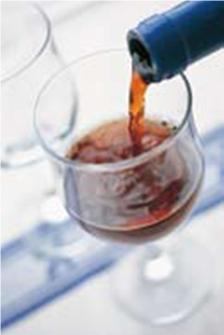
The author once did an experiment: using three different kinds of water to brew the same kind of coffee in a plug pot. As a result, all the friends who tried it on the spot could clearly point out which cup tastes sweeter and better, and which one tastes poor. These friends do not know in advance which kind of water I use, nor do they know the order in which I use it, but everyone thinks that the most insipid water is RO reverse osmosis water! On the contrary, the water filtered out by a simple household water filter tastes better. This common water filter is said to filter out harmful substances in tap water but retain minerals in the water, and it is cheap and easy to use, so it is widely used by coffee players. The best taste is a bottle of mineral water imported from France. Friends who have compared the coffee brewed with RO water all say in unison: mineral water coffee is more complex than RO water coffee, and it is sweeter and better to taste.
But do I have to use imported mineral water? Not necessarily. I've tried many domestic mineral water, too. If you think the cost of mineral water is too high, you can also use the simple filter mentioned above. Just remember: don't filter the water too cleanly, and don't directly use unfiltered tap water.
4. Appropriate water temperature
Occasionally I see someone brewing coffee with boiling water that has just been removed from the stove. When this happens, I always imagine the taste of that cup of coffee in my mind, thinking that there will be a bitter taste from the root of my tongue. Because coffee is not suitable to be brewed with 100-degree boiling water, it will not only scald the coffee but also make it too bitter to swallow, so we have to add a lot of sugar and cream to flavor.
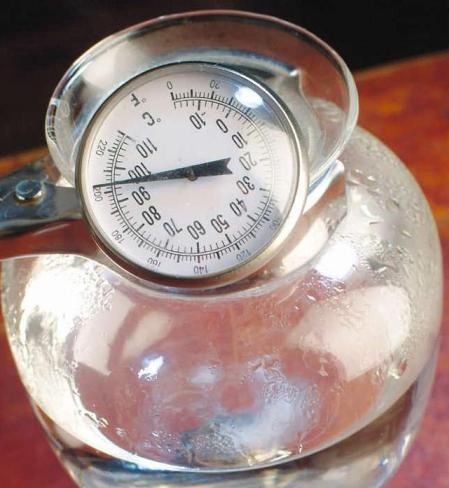
In fact, the water temperature suitable for brewing coffee is about 85 to 95 degrees Celsius, and the brewing temperature depends on the degree of roasting of coffee beans. the general principle is that beans that are deeply roasted are boiled at a lower temperature, while beans that are lightly roasted are at a higher temperature. If you don't know how many degrees of hot water to use at first, it is recommended to start at 90 degrees. This temperature is almost suitable for most coffee beans, and then you can adjust the temperature according to your preference.
In order to accurately judge the temperature, a thermometer is necessary here, and there is also a basis for adjusting the cooking temperature because of the temperature problem. In fact, as long as it is not freshly boiled water, it should not be too hot for coffee. For example, the hot water in a thermos bottle is usually kept at about 90 degrees Celsius and can be directly taken out to make coffee. As for the boiling water that has just been boiled, as long as it is placed to cool it naturally.
If you are really picky about the stability of the temperature, the hot water used for cooking can also be 3-4 degrees higher than the predetermined temperature, because you have to calculate the temperature drop when the hot water is poured into a cold brewer, so a few degrees higher is a reasonable estimate.
5. Make it gently
In the author's view, no matter which method of cooking has a common point: the interaction between brewing coffee and coffee beans, the action of extraction should be done by water, not by the strength of brewers! The only thing the brewer has to do is to let every grain of coffee powder be evenly surrounded by water, and leave the rest of the work to the water.
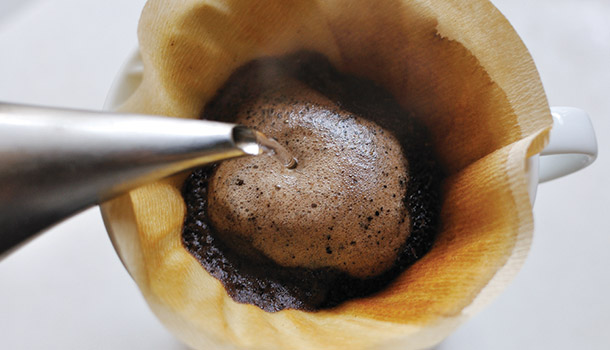
Since brewing coffee is an interaction between water and coffee powder, how can brewers help coffee powder to be completely surrounded by water? The trick is to cook gently. In addition to Espresso after entering the brewing process, the brewer is really unable to handle it, whether it is the stirring of the air stopper or the flushing of the filter kettle, please use the mentality of treating your lover and the procedure of brewing gently. That is to say, no matter what action you do, please gently stir and gently inject water. Do not put the stirring spoon into the coffee pot like a watercolor pen and stir quickly and violently. Let a pile of unpleasant flavors dissolve into the coffee at once Don't use a hot column of water to hit the coffee powder mercilessly. It won't help but burn the coffee beans. In short, if you can brew it with the mood of "want to make a good cup of coffee", the whole process will naturally be very stable and gentle; if you just brew it in a routine manner and do not plan to explore new experiences in the drinking process, the movements will naturally not be gentle, but there will also be some unstable conditions, and it is easy to get a bitter ending if you add up these small details.
Build your own style
In the process of cooking, in addition to these five rules, other data and methods can be slightly adjusted. In other words, when you are a novice, you are advised to follow the clues, follow the steps in the book step by step, and try other people's coffee beans (or stores) at the same time, find out what you like and keep it, while avoiding annoying shortcomings. But slowly, when you have developed your own taste, please try to make some adjustments. These adjustments include the addition of 10 to 20 seconds of brewing time, the adjustment of grinding thickness up or down several squares, the increase or decrease of brewing temperature, and the use of more strength. Wait, in the process of trying, you can find out the coffee that best suits your taste. In order to establish their own coffee style.
In the process of building their own style, whether it is brewing coffee or roasting coffee beans, some friends will be so concerned about other people's criticism that they will lose their own ideas, and end up building other people's style instead. You should know that the so-called "aesthetics" or "taste" is very personal, and everyone's preferences are different, so there is only approval and disapproval of "style", but not right or wrong. When you already have a complete understanding of coffee, at the same time, you have a certain degree of pure familiarity with the techniques of brewing and baking. Please stick to your preferences (here's a tip: it's right and easier to start with baking than from brewing). Always remind yourself that the right cup of coffee should not have any uncomfortable bitterness or sour taste, and there is nothing wrong with working in this direction.
The article is excerpted from "Coffee Taste Chronicles" published by ╱ Su Yan and ╱ Building Block Culture.
Important Notice :
前街咖啡 FrontStreet Coffee has moved to new addredd:
FrontStreet Coffee Address: 315,Donghua East Road,GuangZhou
Tel:020 38364473
- Prev
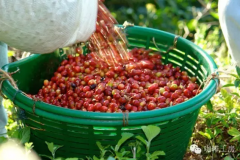
A comparison of the advantages and disadvantages of the production methods of decaf Coffee
The factors affecting the caffeine content, such as the type of coffee beans, soaking time, grinding thickness, cooking method, water temperature, extraction time and so on. Caffeine has some effects on the body, which leads to the popularity of decaffeinated coffee. Decaffeinated coffee means that before roasting, coffee is specially treated to remove 96%, 98% caffeine, and a cup of coffee contains caffeine.
- Next
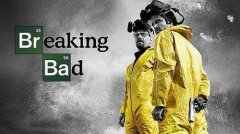
The origin of decaf coffee to water treatment and then to chemical extraction
The so-called decaffeinated coffee means that before the beans are sent to the roaster, the caffeine that affects sleep is separated after processing, but the decaffeinated coffee is not 100% caffeine-free, it can only remove 94% to 98% caffeine, and still contains trace amounts of residual caffeine. At present, there are three commonly used low cause treatment methods, namely, dissolving type, Swiss water treatment method and carbon dioxide.
Related
- Beginners will see the "Coffee pull flower" guide!
- What is the difference between ice blog purified milk and ordinary milk coffee?
- Why is the Philippines the largest producer of crops in Liberia?
- For coffee extraction, should the fine powder be retained?
- How does extracted espresso fill pressed powder? How much strength does it take to press the powder?
- How to make jasmine cold extract coffee? Is the jasmine + latte good?
- Will this little toy really make the coffee taste better? How does Lily Drip affect coffee extraction?
- Will the action of slapping the filter cup also affect coffee extraction?
- What's the difference between powder-to-water ratio and powder-to-liquid ratio?
- What is the Ethiopian local species? What does it have to do with Heirloom native species?

